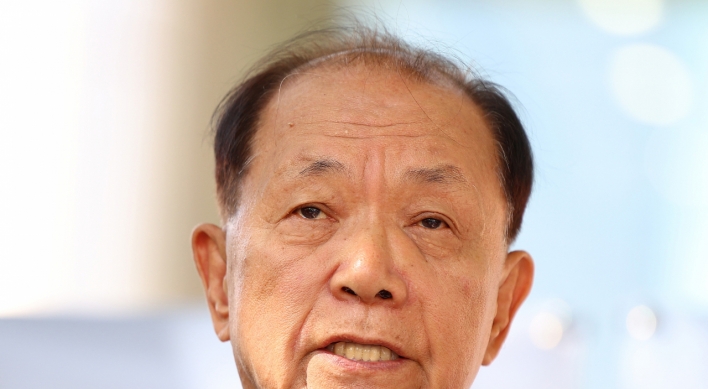[Editorial] Administrative inefficiency
Moving legislature to Sejong deserves consideration
By Korea HeraldPublished : July 3, 2014 - 21:09
Since Sejong City was launched two years ago, 13 government ministries and agencies have moved from Seoul to a town designed as a new administrative hub. In March, the Prime Minister’s Office vowed to hold as many government meetings as possible in Sejong, about 130 km south of the overpopulated capital.
The pledge, however, has hardly been kept, with Prime Minister Chung Hong-won staying in the administrative city for only five days in June. Chung was bound to his office in Seoul partly due to President Park Geun-hye’s overseas trip and the work to deal with the ferry tragedy that took place in April. But it was matters related to the National Assembly that made it more difficult for him to find time to work in Sejong.
Dealing with parliamentary affairs has also taken time and energy from officials at the government ministries that sit in Sejong, about two hours’ journey from Seoul, to the degree of disrupting their concentration on key policy tasks.
The minister and vice minister of strategy and finance, for example, have visited the Assembly once a week since they took office 18 months ago. Early last month, economic ministers abruptly changed the venue of their regular meeting from Sejong to Seoul to squeeze out time to hear speeches by floor leaders of the ruling and main opposition parties. It is routine for most bureau and division chiefs to accompany their ministers to parliamentary committee sessions.
The trouble will further increase after the relocation of five more government agencies to Sejong by the end of this year. The time and cost squandered on shuttling between Seoul and Sejong will ultimately burden the public in the form of delayed and inadequate services.
It is deplorable that both the legislature and the administration have overlooked methods available to reduce this inefficiency. Lawmakers should discard the practice of summoning Cabinet ministers and other senior officials to parliamentary sessions when their attendance is not necessary. Deliberation through video conferencing should be activated in line with Korea’s reputation as an advanced, high-tech country.
In this regard, President Park should also set an example. Since March, Park has held only one teleconference with ministers in Sejong, getting them to attend in person all other Cabinet meetings at the presidential office.
A more fundamental solution to eliminating the inefficiency, which was already expected when lawmakers passed a bill on the administrative town in 2012, may be to move the legislature to Sejong. Few people would oppose or see a problem with the measure.
Nor would it be unthinkable to relocate the presidential office there. It should be noted that no other advanced nation has its administrative and legislative branches in separate cities. The Prime Minister’s Office should consider including such proposals in its ongoing work to improve the plan for the long-term development of Sejong.
The pledge, however, has hardly been kept, with Prime Minister Chung Hong-won staying in the administrative city for only five days in June. Chung was bound to his office in Seoul partly due to President Park Geun-hye’s overseas trip and the work to deal with the ferry tragedy that took place in April. But it was matters related to the National Assembly that made it more difficult for him to find time to work in Sejong.
Dealing with parliamentary affairs has also taken time and energy from officials at the government ministries that sit in Sejong, about two hours’ journey from Seoul, to the degree of disrupting their concentration on key policy tasks.
The minister and vice minister of strategy and finance, for example, have visited the Assembly once a week since they took office 18 months ago. Early last month, economic ministers abruptly changed the venue of their regular meeting from Sejong to Seoul to squeeze out time to hear speeches by floor leaders of the ruling and main opposition parties. It is routine for most bureau and division chiefs to accompany their ministers to parliamentary committee sessions.
The trouble will further increase after the relocation of five more government agencies to Sejong by the end of this year. The time and cost squandered on shuttling between Seoul and Sejong will ultimately burden the public in the form of delayed and inadequate services.
It is deplorable that both the legislature and the administration have overlooked methods available to reduce this inefficiency. Lawmakers should discard the practice of summoning Cabinet ministers and other senior officials to parliamentary sessions when their attendance is not necessary. Deliberation through video conferencing should be activated in line with Korea’s reputation as an advanced, high-tech country.
In this regard, President Park should also set an example. Since March, Park has held only one teleconference with ministers in Sejong, getting them to attend in person all other Cabinet meetings at the presidential office.
A more fundamental solution to eliminating the inefficiency, which was already expected when lawmakers passed a bill on the administrative town in 2012, may be to move the legislature to Sejong. Few people would oppose or see a problem with the measure.
Nor would it be unthinkable to relocate the presidential office there. It should be noted that no other advanced nation has its administrative and legislative branches in separate cities. The Prime Minister’s Office should consider including such proposals in its ongoing work to improve the plan for the long-term development of Sejong.
-
Articles by Korea Herald





![[KH Explains] No more 'Michael' at Kakao Games](http://res.heraldm.com/phpwas/restmb_idxmake.php?idx=644&simg=/content/image/2024/04/28/20240428050183_0.jpg&u=20240428180321)












![[Herald Interview] Mistakes turn into blessings in street performance, director says](http://res.heraldm.com/phpwas/restmb_idxmake.php?idx=652&simg=/content/image/2024/04/28/20240428050150_0.jpg&u=20240428174656)
